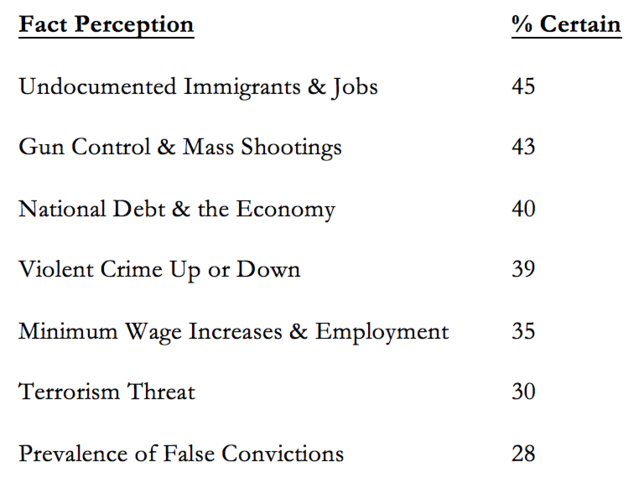Standard pre-Thanksgiving advice: Avoid conflict with your family members who are ideological opposites.
The Nation’s advice for this holiday season: Fight.
Whether it is healthy to have conflictual holidays is a question beyond our competency. But what is fascinating about The Nation article is its emphasis on conflicts over facts. The first piece of advice does not focus on fighting holiday misogyny or the politics of football (those are points #2 and #3). #1 is “be an ambassador of truth.”
“You can’t be expected to know the details of every whack-a-doodle conspiracy theory your family has heard from state-run media in this country. But you can be expected to distinguish things that are true from things that are false.”
That is a high bar, but The Nation goes further: “Do not let falsehoods lie unchallenged. If you hear something that is clearly false, say, ‘That’s not true’. If you hear something that sounds false but you’re not sure how, pull out your phone and Google it.”
This advice is encouraging hubris—unwarranted certainty not grounded in the available evidence.
The assertion that we can be expected to distinguish between what is true and false relatively easily is deeply incorrect. For many realities that influence political debates, the evidence is blurry and open to conflicting interpretations. Legitimate experts often disagree.
Nonetheless, between one-third and one-half of Americans express certainty about these facts.
Examples include the effects of immigration on domestic employment; the effects of gun control; whether the national debt has dramatic negative consequences; whether violent crime is up or down; the influence of raising the minimum wage; the degree of threat from terrorism; or the prevalence of false convictions. The list goes on, but when it comes to politically-influential facts, blurry is common and clarity is rare.
In a national survey in 2017, we asked respondents to consider a series of factual statements for which the known evidence is ambiguous. [Note 1] They indicated whether the statements were “certainly true,” “probably true,” “probably false,” or “certainly false.”
After examining the available public evidence on each of these items, our view is that “probably” is the best answer to each of these items, not “certainly.” Yet certainty is common.

One of the great problems of the current political and media environment is distinguishing between legitimate certainty and unwarranted certainty (hubris).
If we define facts as “descriptions of reality reflecting the best available objective evidence endorsed by prevailing authorities,” then hubris is holding certain beliefs that are not grounded in that evidence. Many are willing to reject expertise and trust their own inclinations, but certainty in that rejection can be defined as hubris.
The problem with this sort of discussion is that readers who feel certain of specific facts will tend to dispute that there is any uncertainty present. They will say, “But this is a clear fact; I should be certain.” It is easy to find an expert who will express certainty (even unwarranted) about any of these items. Certainty is rampant and very difficult to correct specifically because its holders do not recognize its illegitimacy.
The Greek gods thought hubris was a punishable offense. But that could be because the Greeks were deeply concerned with the limitations of knowledge and the human tendency to over-rate it. We live in a different culture that emphasizes our collective achievements in knowledge and our individualism confidence in beliefs.
The contemporary problem is not only hubris but the difficulty of knowing when it is being committed.
A future post will introduce more evidence of the origin of contemporary American hubris, which suggests how we may limit it.
References
Note 1: 2017 Cooperative Congressional Election Study (CCES), N=1000. The statements were framed in each direction to eliminate bias, with a random half of respondents receiving each frame; answers were reversed to match perceptions (i.e., the first statement being “certainly true” is equivalent of the second statement being “certainly false”).
“Undocumented Latino immigrants take jobs from working class Americans” (“Undocumented Latino immigrants do not take jobs from working class Americans”)
“Gun control laws nationwide, mass shootings tend to go down” (“When countries enact gun control laws nationwide, mass shootings do not tend to go down”)
“Large amounts of national debt, like the US currently has, eventually cause great harm to a nation’s economy” (“Large amounts of national debt, like the US currently has, do not necessarily cause great harm to a nation’s economy”)
“Violent crime is going up in the United States” (“Violent crime is not going up in the United States”)
“Increasing the minimum wage usually results in less employment” (“Increasing the minimum wage does not usually result in less employment”)
“False convictions of innocent people are extremely rare” (“False convictions of innocent people occur frequently”
“Terrorist attacks inspired by radical Islam pose a threat to Americans beyond the capacity of our current national security system to prevent” (“Terrorist attacks inspired by radical Islam do not pose a threat to Americans beyond the capacity of our current national security system to prevent”)


